|
Saturdee Opry
Links # 130:
Quasi-Di Stefano 100th Birthday Edition
Saturdee Opry Links' Quasi-Di Stefano 100th Birthday Edition is now posted
for your ambivalance and/or boredom, whichever occurs first. Wine, women, song!
Cigarettes! A virgin angel of God! Mass hysteria! A diminuendo for the ages!
Pretentious explanations! Plus: the Grab Bag! Ezio Pinza! Mask advice!
Horsehair! Grateful Dead philosophy! Dr. Headache! Beverly Sills! An aria in
English! Beauty! And amor, amor, amor, amor! Enjoy the overture, plus all ten
selections, extras, and encore! Or go skeet-shooting, if you prefer.
Saturdee Opry Links Overture!
The effervescent "Don Pasquale," by Donizetti.
https://www.youtube.com/watch?v=hITVvvRTrMA
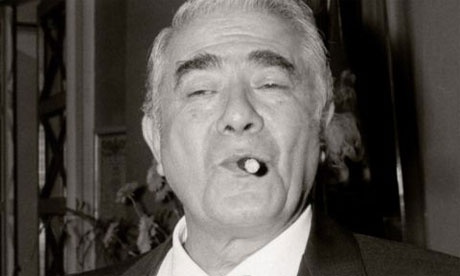
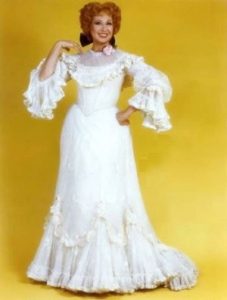
Giuseppe Di Stefano
Bubbles
 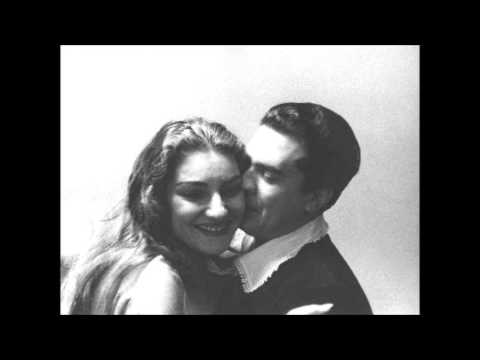

Ezio Pinza
Di Stefano and Callas
Horsehair
1.
There is no fool like an old fool, an adage that I am proving a little more each
day. And there is no fool in opera quite like Don Pasquale in Donizetti's opera
of the same name. What makes him foolish? Too easy. The same thing that renders
all men (young and old) foolish: women! (Forward PC complaints to the corner of
Pork & Beans.)
Synopsis:
In this opera buffa (comedy), one Ernesto has refused the woman that his uncle
Don Pasquale had found for him, and as a result is to be disinherited. Ernesto
adamantly declares his devotion to a young – but poor – widow, Norina. The
foolish solution? Doddering Don decides to subject a young woman to his
pot-bellied physique and encumbered mind! That is, he decides to marry and
produce his own heir, seeing as Ernesto won't cooperate. His friend, Dr.
Malatesta (literally "Dr. Headache") tells Don Pasquale that he is nuts, yet
says he has an ideal woman in mind. He sings the aria, "Bella siccome un angelo"
– "Beautiful like an angel," and, when pressed, reveals she is his sister. None
of this is true, of course. Malatesta then employs the widow, Norina, to profess
her love to the delighted Pasquale---and then acts the shrewiest shrew this side
of Shrewville. This brings Pasquale to what's left of his senses. Suffice to
say: hijinks ensue. Here is this pretty little baritone aria, sung by Russell
Smythe. With English subtitles.
https://www.youtube.com/watch?v=Xfk0ePLwcF0
Translation:
http://www.aria-database.com/search.php?individualAria=551
2.
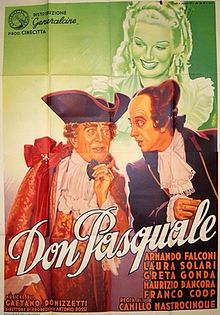
While decrepit Don Pasquale drools (more than usual) and rubs his hands together
in anticipation of getting them on the model of femininity, restraint, delicacy
that Dr. Malatesta has promised. . .the femme fatale enlisted to play this part
muses about how she knows the means of wrapping any man around her little
finger. This is the charming staple of all bel canto soprano repertory, "So
anch'io la virtù magica," from Donizetti's "Don Pasquale." Now, I'm giving you
two versions, John and Yoko. What? First is a rather traditional staging with
Beverly "Bubbles" Sills (featured too rarely on SOL), and then with the rather
slutty striding of the irresistable Anna Netrebko. Okay? Don't say I never did
nothin' for ya. (And if you recognize the melody from today's overture, give
yourself ten points of extra credit.)
Setting: Norina's house, Rome, early 19th century
Synopsis: Norina is reading a novel about love. After reading a passage aloud,
she explains that she knows all the tricks of ensnaring a man.
Translation:
http://www.aria-database.com/search.php?individualAria=553
SILLS (note: aria starts around 2:25). She suggests the gist with mere use of a
cigarette.
https://www.youtube.com/watch?v=lC3AO07vR0s
NETREBKO. She uses more than a cigarette.
https://www.youtube.com/watch?v=ab1-furp1LU
Annnnnnd, for the many SOL followers who complain that the arias are not in
English, here is the Australian soprano, Rosalind Keene, with the same
selection. Proof positive that, when Italian is translated into English,
something is lost in the translation.
https://www.youtube.com/watch?v=20mxE7gddQo
3.

It is a well-known idea among advocates of the Grateful Dead---and members of
the band, as well---that they aren't the creators of the elusive quicksilver
epiphany moments of their concerts, only conduits. What in unholy hell does this
have to do with opera, you are screaming? Not much, perhaps, but it does have
something to do with this aria---in which an actress sings that she is just a
"vessel" of the creator; that she is "the verse's music. . .the fragile
instrument." Okay, how's that for a strange introduction to the alluring "Io son
l'umile ancella," from "Adriana Lecouvreur," by Francesco Cilèa? I think it is
fair to say this is a "safe" aria usually reserved for older sopranos whose
pipes are starting to rust. Which is no slight, as it is nonetheless lovely and
cherished. And when sung by Maria Callas, probably is maxed out for expressive
power, subtlety, beauty.
https://youtu.be/-NfJaCUEaV8
Setting: backstage at the Comédie-Française, Paris, 1730
Synopsis: The Prince de Boullion and the Abbe de Chazeuil meet the company at
the Comédie-Française before the show. Although the Prince is the patron of
Adriana's main competition as an actress, Duclos, he compliments Adriana. She
replies to the compliments by saying that she is only the vessel through which
the muses work.
Translation:
http://www.aria-database.com/search.php?individualAria=1109
SOL EXTRA!
I was going to post a wonderful duet with Maria Callas and Nicola Monti from "La
Sonnambula" by Bellini, but then I read the opening lines of the translation,
and decided against it. Here they are:
"Pardon! I'm jealous of the wandering zephyr
Who jokes you with horsehair, with the veil;
Until the sun that aims at you from the sky,
Finish the mirror that makes you."
(I don't mind telling you, it's been a long time since I've been joked with
horsehair by a wandering zephyr. "Finish the mirror that makes you" sounds
either Buddhist or cheap self-help advice.)
https://britishbedsworldwide.com/articles/horse-hair-in-beds-and-mattresses/
4.
Reached down into the ol' SOL grab bag, came up with used COVID masks. What
idiots put them in there? Damn. Please remember to cut the strings before
disposing! Birds and other animals can choke on these things. Washed my hands
with rubbing alcohol, and reached down again into the grab bag, came up with. .
.Ezio Pinza! Some of you might not realize that Pinza is---by unanimous
acclaim---one of the absolute greatest bass-baritones in the history of opera.
Anytime he sang, it was some enchanted evening, let me tell you (https://www.youtube.com/watch?v=oShTJ90fC34
). Here he is with a jaunty little Mozart ditty that magically anticipated
Donald Trump! Really! This is "Ha! Wie will ich triumphieren! (Wenn sie euch zum
Richtplatz führen)" from "Abduction from the Seraglio." Translation: "Ah, how I
shall triumph when they lead you to the gallows!" Yessir. Ezio not only sings
this with customary alacrity, aplomb, but throws in a ground-scraping low D in
the bargain.
Synopsis: Osmin, custodian of the Pasha's seaside country house, sings of his
delight when Pedrillo, Belmonte, Blondchen, and Konstanze are captured and
hanged.
https://www.youtube.com/watch?v=k08i0ua0GOg
Translation:
http://www.aria-database.com/search.php?individualAria=291
SOL will be back after a short break to attend to customers.
https://www.youtube.com/watch?v=y189-69cQPs
5.
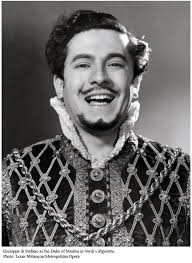
Di Stefano
At a thematic loss, I was once again surrendering to the SOL grab bag, when I
realized that today is an auspicious occasion---the 100th anniversary of the
birth of a tenor considered by many to have been the best of the bunch. At least
before he added too much wine and women to song. And cigarettes. I speak, of
course, of wonderful Giuseppe di Stefano, born on this date in 1921, endearingly
nicknamed "Pippo" by friends and family. Quoth Luciano Pavarotti: "Di Stefano is
my idol. There is a solar voice...It was the most incredible, open voice you
could hear. The musicality of di Stefano is as natural and beautiful as the
voice is phenomenal." The story of the somewhat obstreperous, capricious Di
Stefano is like something out of a myth. Born in the tiny village of Catania in
Sicily, he was the only son of a cop-turned-cobbler and a dressmaker mother.
There apparently was no thought of training Pippo in anything other than the
priesthood, and he was indeed educated at a Jesuit seminary---which probably was
rather like the Widow Douglas trying to "sivilize" Huck Finn in Twain's book. At
sixteen, while out playing cards with the boys, Giuseppe spontaneously burst
into song after a losing hand. So stunned were his friends at the natural
greatness of the voice, that they insisted the kid get some vocal training. Two
years later he did---studying in earnest with the baritones Luigi Montesanto and
Mariano Stabile---but this was interrupted by the, uh. . .second world war. Even
in the army, Pippo was so given to singing, and was such a crappy, incorrigible
soldier, that his commanding officer---get this---decided that the young man
could better serve his country by singing, and kicked him out! When Italy was
defeated, Pippo fled to Switzerland, and after a period of internment, persuaded
to be allowed to appear on Lausanne Radio. From there, he rose to quick fame,
and recording a number of native Sicilian songs. All of this springboarded him
into a smash-hit operatic career (in which he famously became Maria Callas's
preferrred tenor.) Here is one of those early recordings, from 1948, of the
Sicilian song, "A la Barcillunisa." I regret there is no translation
available---it is in dialect---but given the beauty of the recording, none is
needed.
https://www.youtube.com/watch?v=rNeqn-cfWlA
6.
Tenors are, of course, celebrated for their clarion high notes, and duly so.
They are also celebrated for their delicate diminuendos, as is the case here,
with Giuseppe di Stefano. Continuing our observance of his 100th birthday
(today), here is Pippo with the tender aria, "Salut, du chaste demeure" ("I
greet you, home pure and chaste") from Gounod's "Faust." The legendarily prickly
Met GM, Sir Rudolf Bing, wrote this in his memoir: "The most spectacular single
moment in my observation year had come when I heard his diminuendo on the high C
in "Salut! demeure" in Faust: I shall never as long as I live forget the beauty
of that sound." The astonishing diminuendo comes around 3:50.
https://www.youtube.com/watch?v=RvN70d4nJfk
Setting: The garden of Marguerite in a German city, 16th century
Synopsis: Approaching Marguerite's house, Faust is struck by the purity of the
dwelling and the innocence of Marguerite inside. He then goes on to thank Nature
for creating the beautiful angelic creature that is Marguerite.
Translation:
http://www.aria-database.com/search.php?individualAria=373
7.
Sometimes, one thinks that opera is largely "stand and sing." (And sometimes,
depending on the opera and staging, it can be.) This, of course, is wrong, as
any/all dramatic action imaginable is to be found in opera. Sometimes, one gets
caught up in the idea that opera is concerned largely, if not solely, with
excellence of technique and delivery. This is only partly the case, the
underpinnings, or "price of admission" to an operatic career. There is the added
element of acting, sometimes wrongly assumed to be little more than corny,
obvious gesture, or hammy facial expression. The greatest moments in opera---for
singer and audience---come when the singer loses himself or herself in the role.
This can be dangerous, as emoting (crying, for instance) can intrude on
vocalizing. Yet it certainly happens, whether in moments of heartbreak,
conflict, anguish, or rage, and it is quite amazing to witness. Here is one such
example, featuring, again, the great Giuseppe di Stefano, whose 100th birthday
is today. This is a short excerpt from Donizetti's "Lucia di Lammermoor," but it
packs a wallop. Di Stefano is supposed to be out of his mind with rage and
betrayal, and boy, does he sound like it. He misses words, slurs others, just as
SOL does in a fit of pique. In this scene, Edgardo (Di Stefano) discovers that
his beloved, Lucia, has signed a contract to marry another man---this because
she has been tricked by a forged letter allegedly from Edgardo, forsaking her.
Got it? Now listen.
https://www.youtube.com/watch?v=VaciEEcng14
Synopsis:
Act 2. Scene 2: A hall in the castle
Arturo arrives for the marriage. Lucia seems distressed, but Enrico explains
that this is due to the death of her mother. Arturo signs the marriage contract,
followed reluctantly by Lucia (who has been forced to sign, having been shown a
forged letter from her beloved, Edgardo, forsaking her. At that point Edgardo
suddenly appears in the hall. Raimondo prevents a fight, and he shows Edgardo
Lucia's signature on the marriage contract. Edgardo curses her, demanding that
they return their rings to each other. He tramples his ring on the ground,
before being forced out of the castle.
Translation: (Start at "Tremi. . .")
https://www.opera-arias.com/donizetti/lucia-di-lammermoor/t%27allontana-sciagurato/
8.
In just about ten years, the natural lyric beauty of Di Stefano's voice---as
beautiful as tenors get---was diminished by fabled drinking, smoking,
"partying." What was once pure became, oh, broader, with a wider vibrato and,
overall, a kind of "dry" quality. The high notes sounded strained, reached for,
unnatural. His star quality---and Callas's affection as a singing
partner---prolonged his career. He even undertook an infamous farewell tour with
her in 1973, when both had all but lost their voices entirely. Money? I dare
say, as it sold out everywhere, anyhow. SOL today celebrates Pippo at his best,
which means the early days. Here is the aria, "Una vergine, un angel di Dio,"
from 1949, live in Mexico City, from Donizetti's "La Favorite." Some will find
it crass to say that he rivaled Lanza, because he was technically a much finer
and more accomplished singer---and bonafide opera star, which Mario was
not---but by this, I mean the ardor (and power) he invested in "the big note"
was almost equally hair-raising. As is evidenced here.
https://www.youtube.com/watch?v=sd3weMfWuRA
Setting: the monastery of St James of Compostella, Castile, Spain, 1340
Synopsis: Fernand tells Balthasar, the Father Superior of the monastery, that he
would like to renounce his vows because he has fallen in love with a woman.
Uh-oh! Although he doesn't know anything about her, he does know that she is
young and beautiful like an angel and that he cannot get her out of his
thoughts. The devil, you say!
Very Bad Translation:
https://www.opera-arias.com/donizetti/la-favorita/una-vergine-un-angel-di-dio/
9.
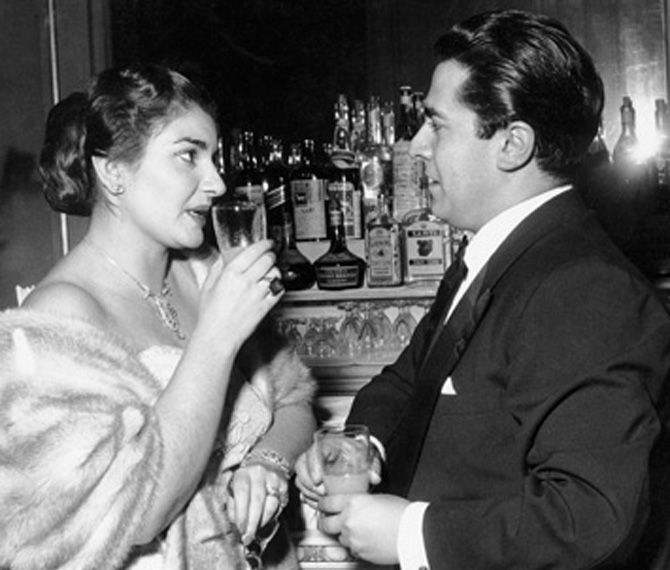
Okay, it's silly of me, I know---a tribute to Giuseppe di Stefano without Maria
Callas? Problem is, many of the Youtube excerpts are extended sequences and
inadequately identified, so I can't give them any context. Here is something of
an exception. This is fuller sequence from which the short extract was used in
post # 7 ("Di Stefano Goes Mad.") You'll hear that Callas goes a little mad,
too, notably with the last note (which must be somewhat optional.) Can't tell
you where and when this was, because the person who posted it apparently didn't
know, either. Certainly it is early in the Di Stefano/Callas partnership,
probably the early '50's. The baritone is probably Tito Gobbi. (THANK YOU FOR
THIS, BONNIE TONE.)
Synopsis.
Act 2. Scene 2: A hall in the castle
Arturo arrives for the marriage. Lucia seems distressed, but Enrico explains
that this is due to the death of her mother. Arturo signs the marriage contract,
followed reluctantly by Lucia (who has been forced to sign, having been shown a
forged letter from her beloved, Edgardo, forsaking her. At that point Edgardo
suddenly appears in the hall. Raimondo prevents a fight, and he shows Edgardo
Lucia's signature on the marriage contract. Edgardo curses her, demanding that
they return their rings to each other. He tramples his ring on the ground,
before being forced out of the castle.
https://www.youtube.com/watch?v=qF0M9y4lyoE
Translation:
https://www.opera-arias.com/donizetti/lucia-di-lammermoor/t%27allontana-sciagurato/
FINAL BOW:
Our quasi-tribute to the great Giuseppe Di Stefano, on the occasion of his 100th
birthday, closes with amor, amor, amor, amor. These, of course, are the last
words sung in this most famous of duets, "O Soave Fanciulla," from Puccini's "La
Boheme."
Synopsis:
Despite having met only minutes before, well, this is opera, so Rodolfo and Mimi
fall in love. It is, after all, Christmas Eve, and both are alone, cold. What
more excuse is needed? Before leaving to join compadres at the Cafe Momus, they
declare their love for one another in this duet, which translates, more or less,
to "O beautiful moonlit girl. . ."
"E al ritorno?"
"Curioso!"
https://www.youtube.com/watch?v=yvc86-r-ETw
Translation:
https://en.wikipedia.org/wiki/O_soave_fanciulla
Saturdee Opry Links ENCORE!
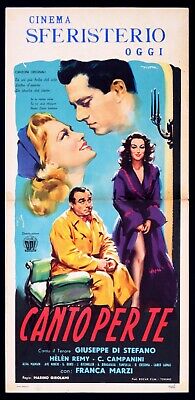
Giuseppe Di Stefano could have been a Lanza-esque movie star, if he'd wanted.
Good thing he didn't! (This little foray into film did not go well for him,
reportedly because the director was not too interested in given him screen
presence.) Here is a little semi-crooned performance from an Italian film in
1953, "Canto per Te." The pop-esque tune translates to "The Path of the
Heart"---but is not the one commonly found in on-line translation. No
translation of this one is available.
Saturdee Opry links 2nd ENCORE!
Ezio Pinza with a very expeditious little tune, perfect for summer. Vulgar?
Alimentary, my dear Watson. (Note: the singing portion begins at about the 2/3
mark.)
https://www.youtube.com/watch?v=K1U2lE7ALPE
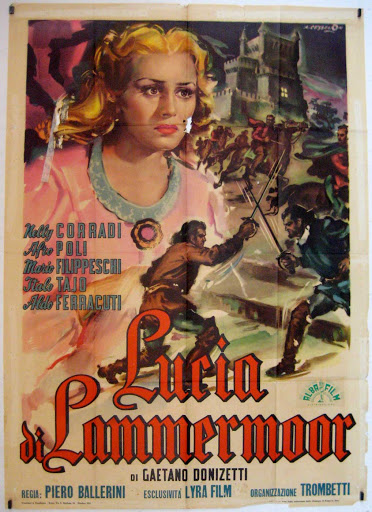
Back to Opera Links
Back to Home Page
|



